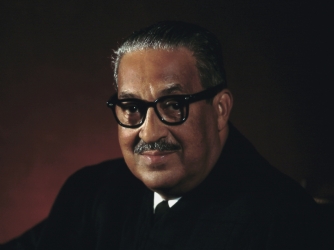

Born in Baltimore, Maryland on July 2, 1908, Justice Marshall was the grandson of a slave. After completing high school in 1925, Justice Marshall followed his brother at the historically black Lincoln University in Pennsylvania. His classmates at Lincoln included a distinguished group of future Black leaders such as the poet and author Langston Hughes, the future President of Ghana, Kwame Nkrumah, and musician Cab Calloway.
In 1930, he applied to the University of Maryland Law School, but was denied admission because he was Black. This was an event that was to haunt him and direct his future professional life. Justice Marshall sought admission and was accepted at the Howard University Law School that same year and came under the immediate influence of the dynamic new dean, Charles Hamilton Houston.
| 1933 | Receives law degree from Howard U. (magna cum laude); begins private practice in Baltimore | |
| 1934 | Begins to work for Baltimore branch of NAACP | |
| 1935 | With Charles Houston, wins first major civil rights case, Murray v. Pearson (desegregating University of Maryland Law School) |
|
| 1936 | Becomes assistant special counsel for NAACP in New York | |
| 1940 | Wins first of 29 Supreme Court victories (Chambers v. Florida) (police pressure) | |
| 1944 | Successfully argues Smith v. Allwright, overthrowing the South’s “white primary” | |
| 1948 | Wins Shelley v. Kramer, in which Supreme Court strikes down legality of racially restrictive covenants | |
| 1950 | Wins Supreme Court victories in two graduate-school integration cases, Sweatt v. Painter and McLaurin v. Oklahoma State Regents | |
| 1951 | Visits South Korea and Japan to investigate charges of racism in U.S. armed forces. He reported that the general practice was one of “rigid segregation”. | |
| 1954 | Wins Brown v. Board of Education of Topeka, landmark case that demolishes legal basis for segregation in America | |
| 1961 | Defends civil rights demonstrators, winning Supreme Circuit Court victory in Garner v. Louisiana; nominated to Second Court of Appeals by President J.F. Kennedy | |
| 1961 | Appointed circuit judge, makes 112 rulings, all of them later upheld by Supreme Court (1961-1965) | |
| 1965 | Appointed U.S. solicitor general by President Lyndon Johnson; wins 14 of the 19 cases he argues for the government (1965-1967) | |
| 1967 | Becomes first African American elevated to U.S. Supreme Court (1967-1991) | |
| 1991 | Retires from the Supreme Court | |
| 1993 | Passes away at 84 |
Source: This biography is provided by ThurgoodMarshall College.
